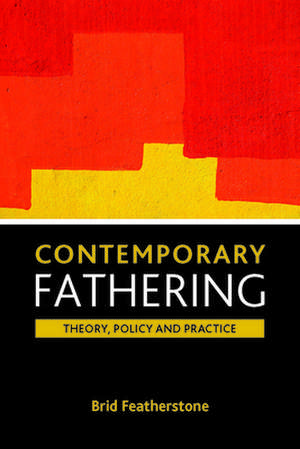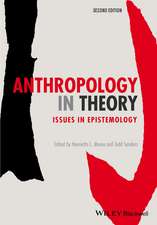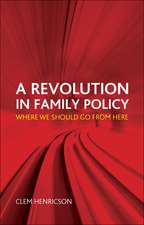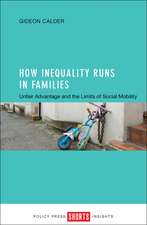Contemporary fathering – Theory, policy and practi ce
Autor Brigid Featherstoneen Limba Engleză Paperback – 14 apr 2009
Since 1997, child welfare services have been faced with new demands to engage fathers or develop father-inclusive services. This book emerges from work by the author as a researcher and educator over many years on the issues posed by this agenda for child welfare practitioners in a variety of contexts. In locating fathers, fathering and fatherhood within a historical and social landscape, the book addresses issues seldom taken up in practice settings. It explores diversity and complexity in fathering in different disciplines such as psychoanalysis, sociology and psychology and analyses contemporary developments in social policies and welfare practices. The author employs a feminist perspective to highlight the opportunities and dangers in contemporary developments for those wishing to advance gender equity.A key strength of the book is its inter-disciplinary focus. It will be required reading for students, graduate and postgraduate, of social work, social policy, sociology and child and family studies. Academic researchers will also find the book invaluable because of its breadth of scholarship.
| Toate formatele și edițiile | Preț | Express |
|---|---|---|
| Paperback (1) | 305.91 lei 22-36 zile | |
| Bristol University Press – 14 apr 2009 | 305.91 lei 22-36 zile | |
| Hardback (1) | 775.87 lei 43-57 zile | |
| Bristol University Press – 14 apr 2009 | 775.87 lei 43-57 zile |
Preț: 305.91 lei
Nou
Puncte Express: 459
Preț estimativ în valută:
58.55€ • 63.62$ • 49.22£
58.55€ • 63.62$ • 49.22£
Carte disponibilă
Livrare economică 31 martie-14 aprilie
Preluare comenzi: 021 569.72.76
Specificații
ISBN-13: 9781861349873
ISBN-10: 1861349874
Pagini: 232
Dimensiuni: 156 x 234 x 12 mm
Greutate: 0.36 kg
Ediția:New.
Editura: Bristol University Press
Locul publicării:United Kingdom
ISBN-10: 1861349874
Pagini: 232
Dimensiuni: 156 x 234 x 12 mm
Greutate: 0.36 kg
Ediția:New.
Editura: Bristol University Press
Locul publicării:United Kingdom
Recenzii
This important book fills a huge gap in understandings of fathering in social policy and social work. Theoretically sophisticated, yet accessible, it links insights from sociology, psychology and gender studies to policy and practice agendas to provide compelling arguments about why and how fathers need to be engaged within social interventions. It is required reading for academics, policy makers and practitioners. Harry Ferguson, Professor of Social Work, University of Nottingham
Brid Featherstone's Contemporary Fathering is a brilliantly researched, richly detailed, and eloquent book that speaks across, and to, a range of complementary theoretical perspectives that are rarely joined in current writing on fatherhood. Drawing on her decade-long experience as a researcher and educator working in child welfare issues in Britain, Featherstone's writing embraces theoretical sophistication, accessibility, and real life examples of the challenges involved in developing father-inclusive programs and services. This book will have wide appeal to academics, service providers, policy makers, and the general public interested in families and changing fatherhood in the twenty-first century. Andrea Doucet, Professor of Sociology, Carleton University (Canada), and author of Do Men Mother?
This book is essential reading for anybody researching fathering, all the social professions that work with both men and women caring for children, and students across the social sciences. Alistair Christie, University College, Cork
This book is an important tool in providing the background and the practical experience that is needed to deliver services that include fathers, at a time when more and more is expected of practitioners. It is well researched, scholarly and detailed and reflects the author's vast experience of working with fathers from a feminist perspectives. Becky Sibert, Children & Young People Now, 2009
This slim volume is an excellent compendium of ideas, data, perspectives and reflections about involving and working with fathers across the social services. Those wishing to respect, recognize and involve fathers without negating women and mothers will find that 'Contemporary Fathering' provides a thousand points of entry to that complex conversation. Christopher Walmsley in Men and Masculinities
Notă biografică
Brid Featherstone, School of Sociology and Political Science, National University of Ireland, Galway
Cuprins
Acknowledgements
One: Introduction
Locating service provision issues within contemporary political developments
Locating this book: theoretically (and political) speaking
Aims and structure
Two: The contemporary context
Introduction
Change, continuity and diversity
Work and care
Fathers are doing what?
Fathers, violence and abuse
A brief look at the implications for practice
Conclusion
Three: The historical context
Introduction
Images, roles, responsibilities
From rights to duties to responsibilities: fathers ‘unmade’
Conclusion
Four: Freud and his legacy
Introduction
The ‘daddy’ of them all
It’s ready mummy who counts
‘Return’ to the father
The feminist return to mummy and daddy, or maybe not?
Recent developments in ‘mainstream’ psychoanalysis: refinement and critique
Poststructuralists: deconstructing the father?
Conclusion
Five: Psychological perspectives
Introduction
The background
Developmental psychology: truth or norm?
The child, the mother and attachment anxieties
The ‘role’ of the father in child development: beyond developmental psychology
Impact of father involvement on children
‘Critical’ psychologies
Conclusion
Six: Sociological perspectives
Introduction
The ‘role’ of the father
Sociology and family journeys
Family practices and intimacy: what about fathers?
Sociology and fathers: future directions?
Conclusion
Seven: The politics of fatherhood: contemporary developments
Introduction
Categorising the politics of masculinity: where do fathers fit?
Why are men getting involved?
Decoding their calls and claims
Feminism and fathers’ groups
Discussion
Conclusion
Eight: Contemporary social policies
Introduction
Policy matters
New Labour: from welfare to investment
‘Distant’ fathers
Rights, responsibilities and fathers
Antisocial behaviour and the Respect agenda
Child support
New Labour, fathers and the ‘democratic’ family
Some comparative insights
Conclusion
Nine: Working with fathers
Introduction
Setting the scene
Fathers Matter: round 1
Dads talk about services
Constructions of fathers, mothers and children
But what did mothers say?
Fathers Matter: round 2
Survey of education
Discussion
Reflections on Complexity in a context of denial
Conclusion
Ten: Reflections on a decade of working with fathers
Meeting fathers: a learning process
Engaging fathers: policy and practice
Conclusion
Eleven: Concluding remarks
References
Index
One: Introduction
Locating service provision issues within contemporary political developments
Locating this book: theoretically (and political) speaking
Aims and structure
Two: The contemporary context
Introduction
Change, continuity and diversity
Work and care
Fathers are doing what?
Fathers, violence and abuse
A brief look at the implications for practice
Conclusion
Three: The historical context
Introduction
Images, roles, responsibilities
From rights to duties to responsibilities: fathers ‘unmade’
Conclusion
Four: Freud and his legacy
Introduction
The ‘daddy’ of them all
It’s ready mummy who counts
‘Return’ to the father
The feminist return to mummy and daddy, or maybe not?
Recent developments in ‘mainstream’ psychoanalysis: refinement and critique
Poststructuralists: deconstructing the father?
Conclusion
Five: Psychological perspectives
Introduction
The background
Developmental psychology: truth or norm?
The child, the mother and attachment anxieties
The ‘role’ of the father in child development: beyond developmental psychology
Impact of father involvement on children
‘Critical’ psychologies
Conclusion
Six: Sociological perspectives
Introduction
The ‘role’ of the father
Sociology and family journeys
Family practices and intimacy: what about fathers?
Sociology and fathers: future directions?
Conclusion
Seven: The politics of fatherhood: contemporary developments
Introduction
Categorising the politics of masculinity: where do fathers fit?
Why are men getting involved?
Decoding their calls and claims
Feminism and fathers’ groups
Discussion
Conclusion
Eight: Contemporary social policies
Introduction
Policy matters
New Labour: from welfare to investment
‘Distant’ fathers
Rights, responsibilities and fathers
Antisocial behaviour and the Respect agenda
Child support
New Labour, fathers and the ‘democratic’ family
Some comparative insights
Conclusion
Nine: Working with fathers
Introduction
Setting the scene
Fathers Matter: round 1
Dads talk about services
Constructions of fathers, mothers and children
But what did mothers say?
Fathers Matter: round 2
Survey of education
Discussion
Reflections on Complexity in a context of denial
Conclusion
Ten: Reflections on a decade of working with fathers
Meeting fathers: a learning process
Engaging fathers: policy and practice
Conclusion
Eleven: Concluding remarks
References
Index









